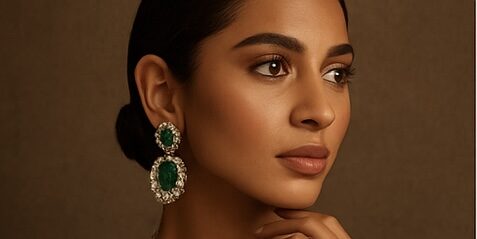With consumers increasingly prioritising health and wellness in the post-pandemic world, how can luxury brands embrace the subject while still being aligned with their core identity that resonates with their current audiences? DLG’s Social Media Practice Lead Anne-Sophie Scharff discusses how brands can tap into this opportunity.

From mindfulness tools, luxurious retreats and self-care activities, the subject of health and wellness has never been a more popular topic for luxury brands to tap into, as a way of connecting with consumers and their changing behaviours. Here’s why it works.
Throughout the global COVID-19 pandemic, one of the key trends of consumer behaviour that emerged was a renewed focus on health and wellness. As people were forced to reflect on their busy lifestyles and habits, many have adopted new healthier ways to live resulting in a shift in consumer priorities and consumption.
Pre-COVID, mental and emotional wellness were already established as a key trend within the wellness space but these are expected to grow even further in the future as we settle into the “new normal”, according to a report by McKinsey published earlier this year.
With consumers increasingly prioritising wellness, it comes as little surprise that many brands are positioning themselves to address this growing interest and become part of this cultural shift and conversation. But how can brands join in on the topic of wellness and well-being while being aligned with their core identity and crafting a message that resonates with their current audiences?
The answer lies in being able to create a personal and meaningful connection with your audience, by engaging them on subjects that they care about. One way that some brands have been successful, is by providing tools and ideas to foster creativity and support their communities. Many studies have shown the numerous benefits of performing creative activities for our mental and emotional health and with the challenges that consumers have faced in recent times, there is no better time to engage them on the subject.
Take Chopard, which launched its Stay Happy campaign last year offering users various ways of cultivating their share of daily happiness. From drawing challenges, music playlists and documentaries retracing the journey of exceptional jewellery creations, the activities curated by Chopard’s Artistic Director, Caroline Scheufele provided a toolkit for users to enjoy together at home.
By focusing on activities that were of genuine interest for the brand such as cinema, Chopard managed to create a campaign that felt authentic while also exposing the audience to their rich brand heritage.
Another example is designer Manolo Blahnik who launched the Smile Initiative, as a collection of his passions and obsessions to be shared with loved ones. Partnering up with the Mental Health Foundation, the initiative shares books and movies ideas, family recipes to cook together as well as a chic colouring book to recreate the brand’s most special pieces. By sharing his personal experiences, users were able to gain a more intimate view into the lifestyle of the iconic designer, which in turn helped create a more meaningful opportunity to connect with the person behind the brand in a personal way.

Credit: Courtesy of Manolo Blahnik.
Luxury brands are not the only ones exploring how to engage with consumers on health and wellness. Other brands in different categories have taken it upon themselves to tackle the topics of mental health head on by partnering with relevant organisations and activists in the field with the hope of creating healthy discussions around the topic and providing concrete resources to their communities.
Initially aimed at humanitarian workers, athleisure brand Lululemon partnered with the United Nations foundation to launch Peace on Purpose, a series of mindfulness tools to equip users with the resources to respond to adversity and to care for their mental health. Available through the online meditation platform Insight Timer, the audio tools are free and available for everyone to use. In this instance, the brand provided concrete tools to its community to face challenges they were increasingly facing at the height of the pandemic. Partnering up with the UN Foundation and Insight Timer provided Lululemon with greater legitimacy to tackle this particular challenge while also assisting in reaching a wider audience.
Beauty brand Maybelline New York launched its Brave Together campaign with the goal to help destigmatise anxiety and depression by partnering up with leading non-profit organisations. Through the dedicated platform, users can find real-world inspiration and stories from people narrating their own mental health journey as well as access to mental health experts and resources. Every month, new micro to mid-tier influencers who raise awareness on mental health get to share their story, thus enhancing relatability and authenticity. Maybelline also pledged $10 million over five years to leading mental health non-profit organisations, a concrete goal showing their community how committed they are to helping people who suffer from anxiety or depression.
Promoting Healthy Relationships
The pandemic and the resulting social isolation has also challenged the health of our relationships whether with ourselves or others. Some brands have decided to address that topic directly to help their community foster healthy relationships.
Earlier this year, The Body Shop launched its Self Love Uprising campaign with feminists and activists Jameela Jamil and Sara Kuburic leading the conversation. Prior to launching the campaign, The Body Shop also commissioned the Self Love Index, a study to inform self-esteem among women in order to have a better understanding of the topic.
Launched on International Women’s Day, the campaign aimed to inspire users to create 1 million acts of self-love within one year. The initiative facilitates conversations with high-profile activists and shares lists of tips on how to practice self-love every day. Users are also encouraged to share their self-care tips on TikTok with the hashtag #BeRightBackWorld which has already gathered over 5 billion views.
Another example is Absolut Vodka, which launched its Love Responsibly campaign in an effort to highlight the many ways people can love themselves and others responsibly, also reminding consumers that drinking responsibly is a key component of a healthy relationship. The community was encouraged to share online what responsible love meant to them. The campaign premiered during the Golden Globes and was also followed by an Instagram Live series sharing interactive conversations with influencers Danny Pellegrino and Alexandra Rodriguez.
Enabling Well-being Adventures
Finally, after more than a year of staying at home, people are increasingly craving the experience of being in nature and dreaming of escapism. To help fight off cabin fever, some brands have launched campaigns promoting outdoor experiences putting the well-being of their community at the centre.
Earlier this year, automobile brand Lexus set out to create the wellness experience of a lifetime through its “Retreats in Motion” initiative. Clients were able to drive the brand new 2021 Lexus IS and go on a five-day trip through breathtaking routes in California while staying at partners luxury hotels where they were able to indulge in self-care activities. Lexus also partnered with lifestyle media MindBodyGreen to create customised wellness experiences for each client and help promote the initiative. Through the retreats, guests are able to learn about topics ranging from mindful eating to sustainability with leading experts experiencing an all-around wellness experience while getting to test drive Lexus’ latest vehicle.
Finally, activewear and outdoor sports The North Face recently launched its Reset Normal campaign, encouraging people to reset their lives through exploration while addressing inequity in the outdoors. Together with cultural innovators Lena Waithe and Jimmy Chin, the initiative started the Explore Fund Council, a global fellowship with the goal of bringing together experts across culture, entertainment, academia and the outdoors to develop ideas that would support access to exploration. Additionally, the brand has challenged its athletes to reset as well and take a pledge to support outdoors access to everyone through short video series, with the aim to encourage their community to spend more time in nature.
Overall, it is important for companies to acknowledge their community’s quest for personal well-being and whenever possible contributing to it in a way that is authentic for the brand. Absolut Vodka was a good example in the way it recognised the negative impact that alcohol can have on relationships and took ownership of a discussion that was extremely relevant to its industry.
Additionally, the topic of mental and emotional well-being is one that can be difficult to address effectively which is why partnering up with either recognised organisations or leading activists in the field can strongly support not only the development of a campaign and its impact but also provide the required authority to position oneself on the topic.
As wellness remains an opportunity for double digit growth according to Ogilivy, brands that are able to support their community’s well-being by going beyond its product offering and investing in creating meaningful content to deepen the customer experience and connection will be the ones to gain traction in the near future.










